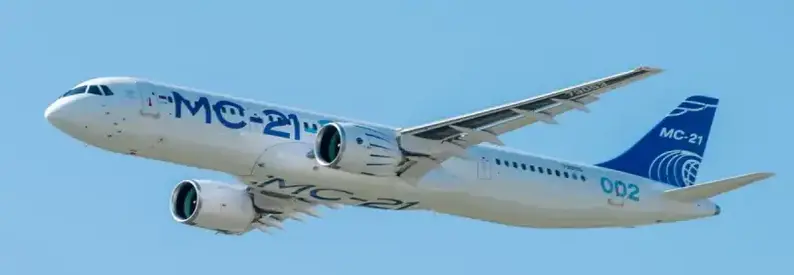Leaked Files Reveal How Western Sanctions Are Crippling Russia’s Aircraft Industry

Leaked internal documents from Russian aerospace firms show that Western sanctions are severely undermining the country’s ability to produce new aircraft, according to the volunteer intelligence network InformNapalm. The files, released on September 24, highlight chronic equipment shortages, outdated technology, and repeated failures to source quality replacements from abroad.
At the center of the disclosures is a “Diagnostics Report on Gear-Shaping Equipment” dated September 24, 2024, from a Russian company working with JSC Yakovlev, a unit of the United Aircraft Corporation formerly known as Irkut. Yakovlev is responsible for Russia’s flagship MC-21 and SJ-100 passenger jets—programs heavily promoted by the Kremlin as symbols of technological independence after sanctions were imposed by the EU, the U.S., and other partners.
The leaked report paints a very different picture. Gear-shaping machines—critical for producing gear systems used in aircraft engines and transmissions—are mostly Soviet-era equipment dating back to 1972 that has long exceeded its service life. Attempts to acquire modern German machines, including MHD systems, have been blocked by sanctions, while alternative supplies from China and CIS states failed to meet quality standards. Russian-made substitutes from Saratov were described as defective, and several imported models such as the Liebherr LS122, ZS-200CNC, and ZS-360CNC were never operational due to malfunctions.
“Gear-shaping remains a critical bottleneck in the production of gear systems for the aviation industry,” the diagnostic report states. Commissioning of new machines has been delayed until at least October 2024 to March 2025, creating significant setbacks for the MC-21 and SJ-100 programs. Factories plan to run two or three shifts to compensate, but the report warns this raises the risk of equipment failure and declining quality.
The leaks underscore how sanctions are rippling through Russia’s defense and aerospace supply chains. Delivery times for advanced machinery have stretched beyond 15 months, financing options have dried up as banks comply with sanctions, and costs for new equipment have surged. Despite official claims of self-reliance, Moscow’s aviation projects remain heavily dependent on foreign technologies and are now constrained by equipment shortages and quality problems.
InformNapalm said it will continue publishing additional documents from the same dataset to provide transparency on the state of Russia’s defense industry and challenge official narratives about technological independence.
The revelations dovetail with earlier reporting. On August 8, Reuters reported that Russia’s aircraft industry delivered just one of 15 planned jets in 2025, as sanctions blocked access to foreign parts and high interest rates stalled investment. Production targets for the MC-21, SJ-100, and IL-114 have been repeatedly cut, with serial output now postponed until 2026.
Taken together, the leaked records and production data show that sanctions are not only slowing deliveries but also eroding the industrial base that underpins Russia’s flagship aviation programs. For a sector once touted as a cornerstone of economic resilience, the combination of outdated machinery, failed imports, and blocked financing is proving a formidable obstacle.
Related News: https://airguide.info/category/air-travel-business/travel-health-security/, https://airguide.info/category/air-travel-business/aircraft-finance/
Sources: AirGuide Business airguide.info, bing.com, united24media.com
